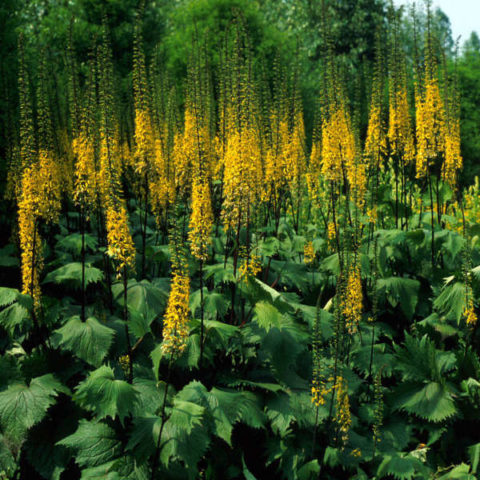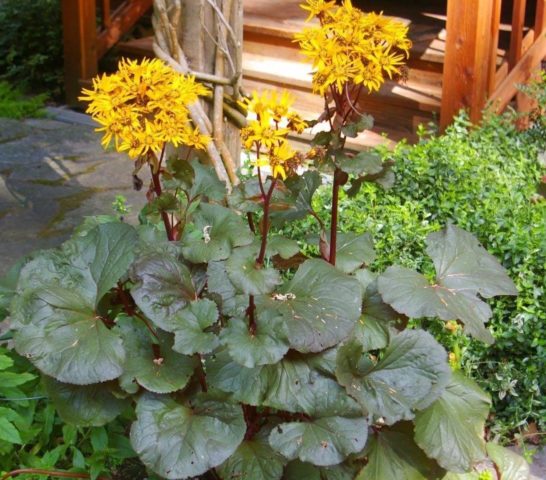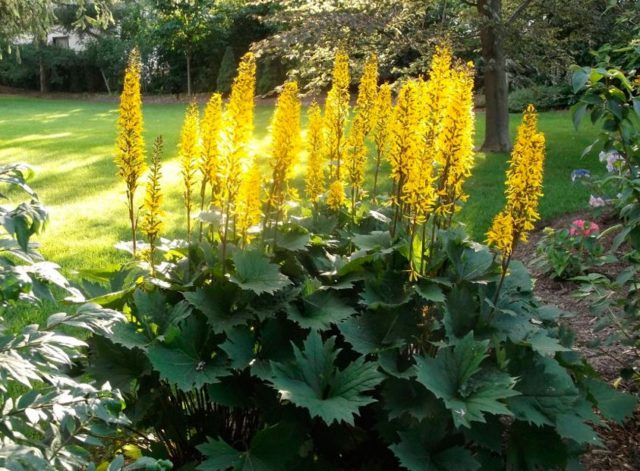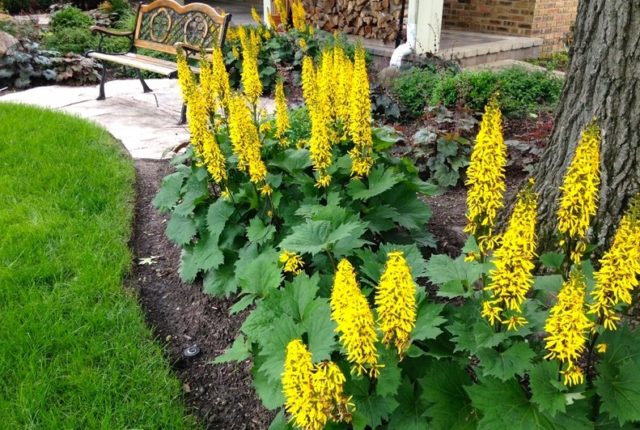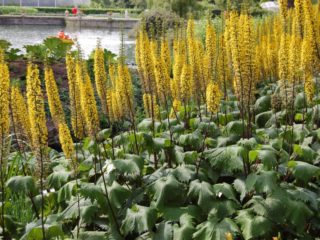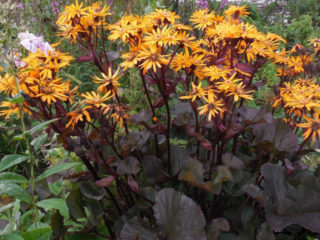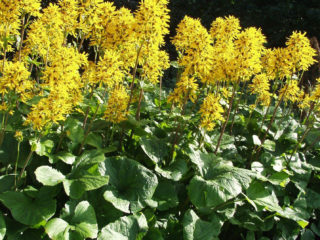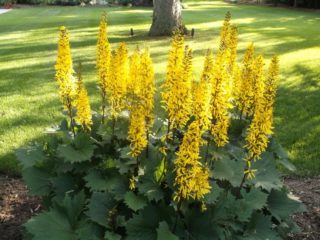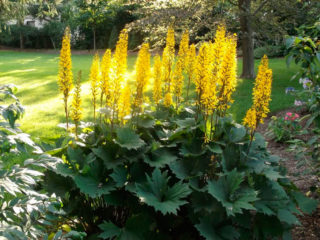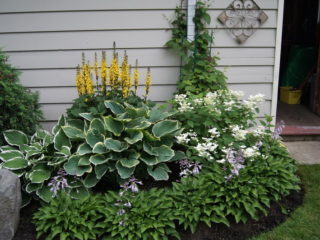Content
Buzulnik Brit Marie Crawford is suitable for garden decoration: it is unpretentious, tolerates shaded areas well, does not need frequent weeding and watering. The large leaves of the plant are the main decoration of the flower. They are capable of reaching 30 cm in diameter. Even a novice florist will be able to grow Brit Marie Crawford.
Description of Britt-Marie Crawford Buzulnik
Buzulnik Brit Marie Crawford is a tall perennial of the Aster family with large, toothed rounded leaves that grow directly from the root rosette. The outer side, distinctly cut with burgundy veins, is tinted dark green, while the inner side is purple. Buzulnik Brit Marie Crawford blooms for 1 month - in August. Its juicy yellow or orange flowers, up to 10 cm in diameter, are collected in corymbose inflorescences. The shape resembles a chamomile.

When placing on the site, it is necessary to take into account that the buzulnik grows up to 1-1.5 m in height
The culture has another name - Ligularia dentate. Brit Marie Crawford is winter-hardy, withstands temperatures down to -30 ° C, quickly acclimatizes, and is common in the wild in China and southern Europe.
Application in landscape design
Buzulnik is a great option for the design of any site. It is used by:
- as a ground cover plant;
- as an accentuating element of landscape decor;
- in the form of a central element of the flower garden composition;
- in group and single landings.
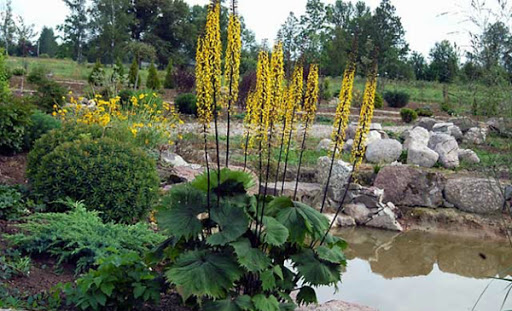
Ligularia frame artificial reservoirs and garden paths, emphasize the front of the house
Buzulnik is indispensable as a decoration and masking of fences, utility blocks, irregularities, hills, lowlands and other problem areas on the site.
Landscape designers are advised to combine the plant with the following crops:
- primrose;
- tulip;
- snake highlander;
- lungwort;
- meadowsweet.

The best way to decorate empty spaces in the garden is to plant a buzulnik
Breeding features
The Brit Marie Crawford variety is propagated in two ways:
- Seeds - this method is rarely used. Saplings grown from seeds, after transplanting to a flower bed, will bloom no earlier than 3 years later. Not every gardener is ready to wait so long. Seeds are harvested directly from the bush and dried. Sowing is carried out in October-November, burying into the ground by 1-2 mm. Seeds will sprout in the spring. In May, when the seedlings get stronger, you can transplant them into open ground.
- By dividing the bush. A plant that is at least 5 years old is taken as a material. There is no need to dig it up entirely. For reproduction, it is enough to cut off a strong, disease-free shoot with several buds. Sections are disinfected in a manganese solution and planted in a pit prepared in advance, fertilized with humus. The seedling is well watered. Reproduction by dividing the bush can be carried out at any time in the fall, in the spring), the cuttings of the buzulnik easily take root. But spring is considered the best moment - a period of active growth.
Planting and leaving
Violation of simple rules of care slows down the growth and development of culture. Caring for Brit Marie Crawford (pictured) is no problem. It is enough to water it once a week.
In the spring, it is recommended to loosen and weed the soil around the bush, then cover with a layer of mulch. Summer care consists in systematic feeding and watering, especially in dry weather.
Only plants planted on depleted soils need feeding. If the soil is fertile and was flavored when planting a flower, top dressing can be omitted.
In the fall, they cut off the foliage, mulch the ground around and cover them with leaves, spruce branches or spunbond. Faded inflorescences are removed immediately, so the bush will retain its decorative effect longer. If it is necessary to collect seed material, 1-2 inflorescences are left on the bush. Buzulnik Brit Marie Crawford throws out the seeds himself, they germinate at a short distance from the mother plant.
Recommended timing
It is permissible to plant a flower in the ground no earlier than May. At this time, he adapts more easily and gets more opportunities for growth and development.
Site selection and soil preparation
It is advisable to plant Buzulnik Brit Marie Crawford in areas with fertile soil, preferably clayey, in order to retain water at the roots. On sandy and sandy loam soils, the plant will die. Buzulnik grows well in lowlands, while hiding and decorating the unevenness of the landscape. The presence of artificial reservoirs on the site is encouraged; placing a flower around them is the best place for planting.
Buzulnik Brit Marie Crawford loves sunlight and grows well in illuminated areas. When placed correctly, its leaves and inflorescences have a richer color.

Direct rays of the sun are contraindicated for the plant, on one side there should be a shadow
It can develop normally in an open place only with regular watering (2 times a week).
Landing algorithm
The culture should be planted in dug and loosened soil. At first, its moisture is the main condition for the normal development of the seedling.
Landing Algorithm:
- Dig up the area to the depth of the shovel bayonet. The root collar of Brit Marie Crawford is very close to the surface.
- At a distance of 70 cm, make holes 40x40 cm in size.
- Sprinkle with plenty of warm water.
- As fertilizer, add ash, humus and superphosphate.Attention! For each seedling, superphosphate, humus and ash are harvested (1: 1: 1/4).
- Mix the fertilizer with the soil inside the pit.
- Place the buzulnik seedling in the hole, cover it with earth and lightly compact it on top with your palms. Do not bury the root collar, it should be slightly above the ground.

The strongest of the seedlings planted in May, in August they can already please with color
After finishing planting, the plants must be watered abundantly.
If at the time of transplantation into the ground, Brit Marie Crawford blooms, experts recommend removing the inflorescences, and with them 1/3 of the leaves. The rest of the landing is the same.
Watering and feeding schedule
In spring and summer, the flower needs abundant watering. Huge leaves quickly lose moisture, and an open root collar needs moisture.
In a rainy summer, watering can be canceled. The same applies to a buzulnik planted near a reservoir.
If, when planting seedlings, all fertilizers were applied, feeding the plant is necessary no earlier than after 2 years. During the period of active growth, the buzulnik is watered abundantly, then cow dung dissolved in water is introduced under each bush (at a concentration of 1:10). Sprinkle lightly with wood ash on top.
The repeated procedure is carried out in May-July, adding 0.5 buckets of humus for each plant. Fertilizing ahead of time can only be bushes growing on infertile soils.
Loosening and mulching
For the normal development of Brit Marie Crawford, it is necessary to provide him with a regular supply of air to the roots, so every time after watering the flower must be loosened. To facilitate the process, you can mix the top layer of soil with peat, this will make the soil lighter and more loose.
Weeding is necessary only in the first 4 months after planting; in the future, Brit Marie Crawford does not need it. Strongly growing leaves make it difficult for weeds to grow and it is always clean underneath.
Mulching the root area keeps the soil moist longer, which is very important for plants planted in open, sunny areas. For mulching, hay, dry leaves, sawdust, humus are suitable.
Pruning
Pruning of Brit Marie Crawford is done after flowering to provide the shoots and leaves with nutrients. If it is not carried out, then the plant's nutrients will take away wilted buds, the growth of green mass will stop, which means that the flower will not be able to survive the winter. The buds are removed with garden shears, the shoots are shortened by 1/3, dry or damaged leaves are removed and burned.
Preparing for winter
Before freezing, Brit Marie Crawford is recommended to be sheltered for the winter, despite its high cold resistance. The ground part of the flower is cut and covered.

Brit Marie Crawford, a frost-resistant buzulnik, needs to be covered with foliage and spruce branches
Plants grown in cold climates are best covered with spunbond. Additional shelter is also used in all regions where little snow falls in winter.
Diseases and pests
Buzulnik Brit Marie Crawford, very resistant to most defeats. Only powdery mildew and slugs can cause significant damage to him.
Slugs attack young leaves and stems. To get rid of them, superphosphate or crushed nutshells are scattered on the ground. You can collect the parasites by hand, digging in the bushes, and pouring ash into the formed holes.
When powdery mildew appears on the leaves, the buzulnik is treated with fungicides, manganese solution or colloidal sulfur (1%).
Conclusion
Buzulnik Brit Marie Crawford is an interesting option for plot decor. He will hide problem areas, while at the same time turning his attention to himself. The flower grows in one place for a long time. Unpretentious in care, which only plays into the hands of novice flower growers.
